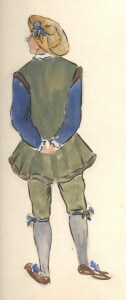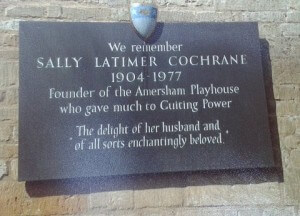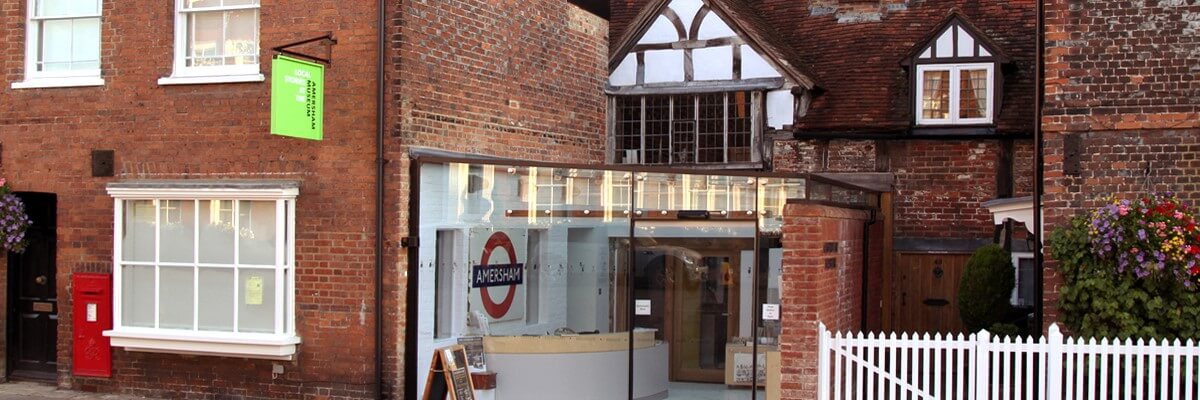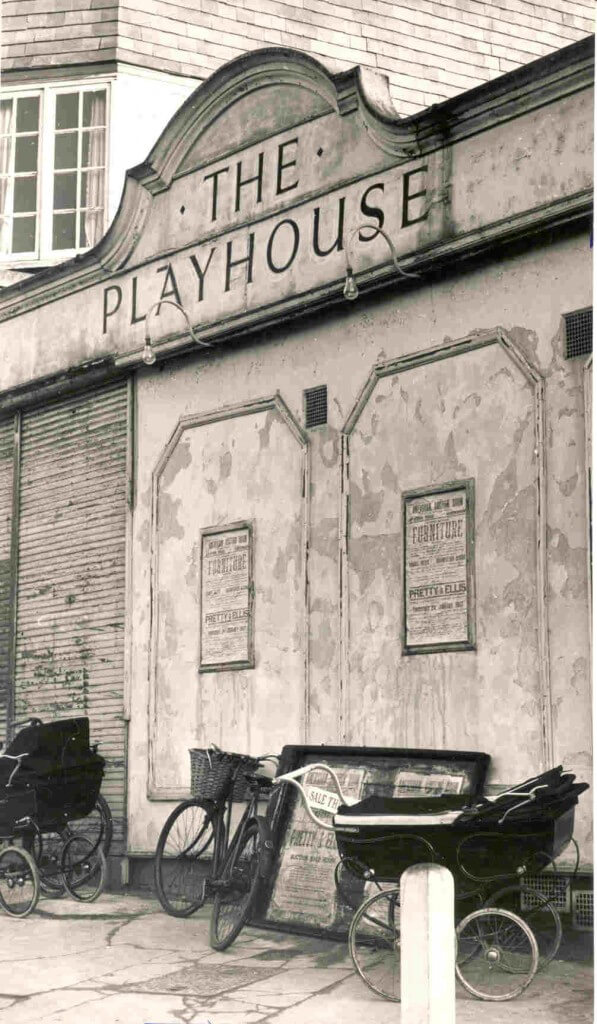This article was written by Stan Pretty and relates to the period under the direction of Sally Latimer and Caryl Jenner between 1936 and 1949.
The Amersham Repertory Players began life at the top of Station Road in what is now the auction rooms of Pretty and Ellis in December 1936 under the direction of actress/director Sally Latimer and John Penrose. The building was renamed The Amersham Playhouse. Penrose left the company at the end of the first season and Sally battled on alone with her young company and very little money. Sally was an experienced and talented actor and director and was fortunate in December 1938 to have engaged an energetic theatrical powerhouse in the person of Caryl Jenner. Even at the then age of just 21, Jenner was remarkably experienced in all aspects of the theatre. Together they continued over 25 seasons until March 1949.
(The Playhouse was resurrected as a professional theatre in September 1949 under the auspices of husband and wife team, John Ferris and Rosa de Leon and continued until its eventual closure as a theatre in 1956. Many more famous names appeared at the theatre during this period. It then became the home of Pretty and Ellis Auction Rooms which it remains today.)
Running as weekly rep., with only a few weeks when the theatre was ‘dark’ sometimes in the summer and the week before their Christmas production, there were over this period in total:
498 Productions
46 Producers (known today as Directors)
280 Actors
233 Actresses
78 Stage managers
43 designers
Click here for a full list of all the people who worked at the Playhouse in this period.
During most of the war years there were 11 performances a week – twice on Tuesday to Fridays, and three times on Saturdays. What time was left during each week was devoted to rehearsing next week’s play, building sets, painting flats, finding props and, for Sally Latimer and Caryl Jenner in particular, the myriad tasks that go into the running of a professional theatre.
Some famous names who appeared at the Playhouse at the start, or early part, of their careers include:
Michael Aldridge
Derek Bogaerde (later Dirk Bogarde)
Jill Bennett
Stuart Burge
Basil Coleman
Denholm Elliott
Glyn Houston
Caryl Jenner
Peter Jones
Richard Marner
Peter Sallis
Robert Stevens
Patrick Troughton
Mary Wimbush
Anna Wing
(in the 50s, many other well-known theatrical names, such as the Waring brothers, also appeared at a briefly revived Playhouse.)
The standard of the young company at the Playhouse was very high as acknowledged by some of the leading critics of the day:
‘….an unshakable conviction on the part of the entire British public with the exception of Amersham that in War time, great art is bugbear, not solace.’ James Agate in The Sunday Times
‘Loyal, admirable, disinterested people.’ John O’London’s Weekly
‘This charming Theatre’ The Manchester Guardian
‘….Must be the hardest working Theatre venture in this country.’ The Catholic Herald
‘Surely one of the most energetic groups of people in the country’ Good Housekeeping
In many of the programmes, Sally or Caryl or both, address their audience with a weekly note headed “My Dear Public”. These take many forms – either exhorting their audiences to spread the word and bring their friends, thanking the public for their support in all sorts of ways, urging them to arrive on time, encouraging them to come to the new plays they present (a particular passion of both directors), encouraging them to try something new, asking for their opinions and sometimes, quite firmly, chastising them for not understanding their difficulties in production. Also there were helpful notes from time to time, as this one from the time of the London Blitz in 1940.
In case of emergencies the theatre has ‘roomy and solid cellars, with exits at both ends, and walls lined with asbestos’. The performances, however, would continue!
In May 1946, the Playhouse joined with the newly formed Guildford Theatre Company in alternating their productions between the two theatres. This gave the unheard-of luxury of having two weeks to prepare a play. But by the end of 1948 this arrangement was no longer financially sustainable and so came to an end. The Amersham Players, in a desperate attempt to survive, then reduced their performances to Thursdays, Fridays and Saturdays only.


The Playhouse suffered many financial vicissitudes throughout its life but bravely struggled on gradually building up a loyal core of supporters which the onset of war actually helped due to the influx of people who moved to the area during the war years. Conversely, the post-war years only increased their difficulties with the loss of temporary residents moving away, continued petrol rationing, the Entertainment Tax and two very severe winters. Post-war plans had included the building of a purpose built theatre in Woodside Road and a Building Fund was set up. Later it was even suggested that an extra 2 pence should be added to the rates which brought a vociferous debate in the local press and, not surprisingly, the idea was never adopted.
Despite the two directors foregoing their own salaries for many months, at the beginning of 1949 the Board of Directors of the Amersham Repertory Players Limited made the following announcement:
THE PLAYHOUSE AMERSHAM
DECISION TO CLOSE THE THEATRE
At a meeting of the Amersham Repertory Players Ltd. at the Playhouse on Thursday the 10th February, 1949, it was resolved by the Board that, in view of the shift of population from the district since the end of the war, and the effect of the regulations limiting the supply of petrol to private users, audiences had fallen much below the minimum to meet the rising costs of production.
The financial position was such that immediate action was imperative, in spite of the fact that an application for assistance made to the Amersham Rural District Council was under active consideration. It was therefore decided that the Amersham Repertory Players, under the direction of Sally Latimer and Caryl Jenner, should cease to function at the Playhouse finally on Saturday, the 19th March, 1949. If, however, a favourable reply should be received from the Council, the Board will of course reconsider the matter, to see if another Company can be formed.
The Board expressed its gratitude to the Artistic Directors, Sally Latimer and Caryl Jenner, for the way in which they had striven, in difficult conditions, to keep the Theatre open and maintain high standards of production for over twelve years.
The Playhouse Mobile Unit, the Touring Company which has been so successful in taking programmes to outlying schools and villages, will continue its work, having already made bookings for the Spring and Summer months. All enquiries about the Unit should be sent to Sally Latimer and Caryl Jenner at the Playhouse, Amersham.

Sally Latimer became a freelance performer and director again and it appears married again and lived with her second husband in Guiting Power in the Cotswolds where she died in 1977. A plaque in the village square commemorates her as “Founder of the Amersham Playhouse”.
Caryl Jenner had started a Mobile Theatre in an old army truck, working from the Playhouse in 1947 in which a small group of actors toured the county bringing theatre to schools and outlying villages. This work continued after the closure of the Playhouse and Caryl was eventually to turn her passion for theatre for young people into the Unicorn Theatre which, for many years, was resident at London’s Arts Theatre, but which now has a permanent base near London’s City Hall on the South Bank, with one theatre named The Caryl Jenner Theatre. Caryl Jenner died in 1973, aged 55.
The work of these two remarkable women played an important role in British repertory theatre, especially during the war years. For many years the Playhouse was the only Repertory Theatre in the county. Their work load was extraordinary, bearing in mind that as well as running a weekly repertory company both artistically and administratively, they were continually having to find time to read scripts, including new writing which they were adamant about promoting, and for many years also running a theatre school on the premises.
Much of what we know of the work of Sally Latimer, Caryl Jenner and the Amersham Repertory Players here in Amersham comes from a valuable and comprehensive collection from the Peter Wilson archive, generously donated to the Museum by Wilson’s widow’s executor, Norma Crowe. Peter Wilson joined the company aged 14 as a general backstage helper, probably in 1941, became a stage manager in August 1942, was later absent on National Service, and returned to the company as Stage Manager and sometimes as actor, staying with the company until its demise in March 1949.
Peter Wilson’s archive has been studied closely by Amersham actor and director, Stan Pretty who is undertaking a précis of its contents combined with the weekly notes to the public from the directors in most of the programmes (there are only 14 missing), as well as comments from the local Bucks Examiner newspaper reports and weekly critiques of the plays.
Please address any enquiries regarding this material or anything to do with the Amersham Playhouse 1936-49 to Stan Pretty via the contact us page.
Amersham Players programmes
Amersham Museum now owns a large number of programmes, including many which Peter Wilson had collected. Peter had been an actor with the Company in 1943 and a Stage Manager in their final years. In August 2014 the Museum was contacted by Norma Crowe, the Executor of Peter Wilson’s widow’s estate, saying that she had a box of material relating to the Playhouse which she wished to donate to the Museum. Most unexpectedly, it contained a vast amount of valuable information about the Playhouse throughout the Sally Latimer years which is still being examined. How Peter Wilson came by some of this material is a mystery but it has proved a priceless collection of information about the Playhouse 1936-1949, including almost all the programmes for that period with the exception of just 14!
See also a page about the theatres and cinemas in Amersham and another page about the Playhouse in the 1949-1956 period.


